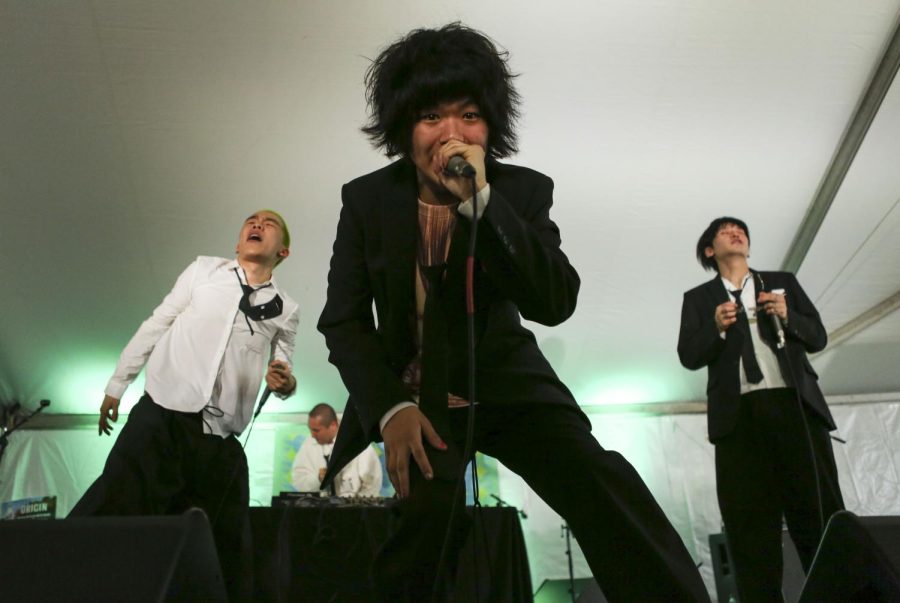Alternative K-pop collective Balming Tiger talks unconventional sound, hosting Joyful Delivery showcase at SXSW
March 20, 2022
Balming Tiger, a rising alternative K-pop group, brought its intense energy to South by Southwest’s music festival, transcending conventional genres and expectations. Currently composed of 11 creatives, the collective releases various media to share its rich culture with the world.
The Daily Texan sat down with Balming Tiger after its set at the International Day Stage on March 17 to talk about its distinct presence and future aspirations.
The Daily Texan: How does it feel to be back in Austin after 2 ½ years?
Mudd the Student (rapper): We haven’t performed in a long time. (I’ve) done some shows in Korea, but the law is super strict. Everybody has to wear a mask, sit down and (make) no noise (because of the pandemic). … It feels like I’ve done an actual show (here at SXSW).
DT: How would you describe your sound as an alternative K-pop group?
Omega Sapien (rapper): wnjn is an R&B soul (singer). I (do) more rap music, and Mudd is mostly influenced by the rock and punk scene. … We love different music, but (we) wanted to work together (and) come up with a genre (so) we could make anything and be like, “This is alternative K-pop.” The word “K-pop” is more of a phenomenon. It’s not really a specific genre. You could pinpoint the aesthetics, but it’s very hard to picture a sound in K-pop. We added another twist to it, so we could do whatever.
DT: Where do you get inspiration for your distinct production style in music and videos?
San Yawn (producer, creative director): Meeting people and (having conversations) is the most powerful inspiration.
MtS: This applies to a lot of us in this generation, but most of it comes from (my) smartphone.
Chanhee Hong (videographer): Our inspiration is (also from) Korean culture and traditions.
OS: “Parasite” director, Bong Joon-ho, said the most personal thing is the most (creative) thing you can do. We’re just trying to speak what we have on our mind — just Korea and what we went through, what we’ve seen and heard.
wnjn (singer-songwriter): (I get inspiration from) the soul and spirit.
DT: You are a music collective that gathers creatives with a diverse range of parts and perspectives. How do you collaborate and decide the direction of a song?
SY: We had a song camp. We rented a house, and we (were) stuck in there for seven days and made music together. It was in the middle of the mountains.
OS: We had three tables and producers. We make a song for 20 minutes each, and afterwards, we will switch. I get a new producer and song that other people from the group made, and I work on that for 20 minutes, and (then) another person comes and works on that for 20 minutes. So, in an hour, we have three songs. … Half of the songs we did for the (International Day Stage) set was from that song camp.
DT: As a label, what role does Balming Tiger play for other rising artists? What’s it like having your own showcase, “Joyful Delivery,” here at SXSW?
OS: The alternative scene is so small in Korea. We’re so blessed with this opportunity to open a showcase (at SXSW). There are artists back in Korea who people will f— with when they come out here in Austin, so we brought everyone over because we have a chance to be here. We share this opportunity to bring the whole culture here.
DT: In the world today where Korean music is increasingly getting more popular overseas, what impact do you hope to make as Balming Tiger?
CH: We want to show a new type of Asian culture. … Balming Tiger is a music group, but we’re also a creative group. (We also make) short documentaries to recommend Asian artists, musicians, directors, photographers — every kind of creative.
OS: There’s so much more to (the music scene) in Korea, and I’m dying to offer that. If we could fill that gap, that’d be nice.
MtS: I hope the day (comes) where we don’t have to call ourselves “alternative K-pop” — just K-pop, because we’ll become the norm.











